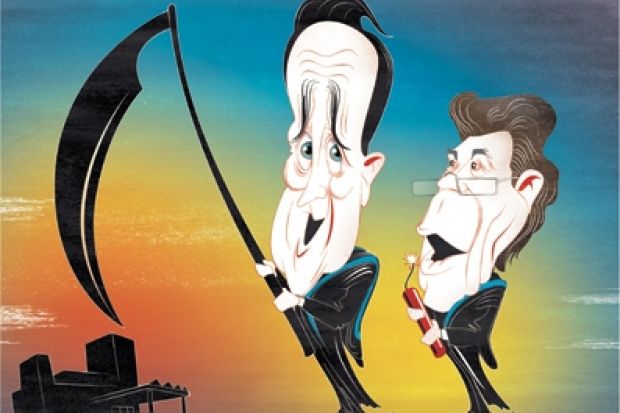It all started with those television leader debates. Now Westminster, following this most messy of elections, has become a sort of grimly addictive soap opera, gripping us all with terrifying plot twists and blossoming romances.
Labour, which wooed academics with large amounts of new cash (some real, some rebadged), and in return tried to micromanage universities to within an inch of their lives, has lost its starring role. In its place we have this surprising new Conservative-Liberal Democrat coalition. What this will mean for universities, as they stare balefully at the shockingly bleak economic situation the new government has been lumbered with, remains to be seen.
One thing is certain: the student experience will remain wedged stubbornly at the top of the political agenda. This will infuriate those vice-chancellors who are desperate to swat away any talk about "student consumers" now that money is tight. But the first (somewhat skinny) coalition policy document, rushed out on day one of our brave new politics, thrusts students to the heart of higher education.
It stresses that any discussion on funding will be measured against the need to improve the quality of teaching - cue a hiss of fury from academics who believe that they should be left alone to get on with the more princely business of research.
It also mentions the need to examine social mobility, student debt and widening access. In other words, here we all are trying to have a nice serious think about higher education policy and those pesky students keep popping up everywhere.
This means that those universities that had hoped to resist the information revolution must now wake up and smell the Starbucks. Students want access to data that will help them to judge the real value of their courses and their institutions. This is a Very Good Thing. Not only will it empower students, but it will also silence the cynics who sneer about the pointlessness of certain "Mickey Mouse" courses: prove that your course ends in a glittering graduate career that matches the marketing and you will have the last guffaw.
And don't tell us that students aren't ready to hear about things such as contact hours because the information is too nuanced or even irrelevant. This is a deception too far in an age when we expect students (or rather graduates) to fork out for their education.
This brings us careering headlong into the biggest unknown of the new political love-in: tuition fees.
The Conservatives have kept their counsel on the future of fees, waiting for the outcome of Lord Browne of Madingley's review this summer. The Lib Dems were much less circumspect, trumpeting in their manifesto that they would phase out fees completely over six years - a backwards-looking pledge that not even the National Union of Students would have been silly enough to suggest in the current economic environment.
This might have meant stalemate on the issue the whole sector has been brooding over for the past year. Yet happily the coalition negotiating team realised that fees could flare into a messy divorce. Hence the agreement that if Lord Browne's review calls for fees to go up, and if the government agrees, Lib Dem MPs can abstain.
This will seem like an utter swizz to students, of course. But given that the policy was only ever somewhere near the bottom of the Lib Dems' so-called "long list" of priorities, and that both Nick Clegg and Stephen Williams, the party's former higher education spokesman, have long been quite relaxed about fees, we shouldn't be surprised that they bent over on this one.
Yet vice-chancellors shouldn't celebrate too soon. It is true that with an emergency Budget looming on the horizon, and endless rumours flying around the sector about the size of the axe swinging in its direction, it becomes harder to avoid the option of increasing fees to protect the quality of our universities. And yes, the academy is still under the Department for Business, Innovation and Skills, and not (yet) the newly rebranded Department for Education. This means that higher education won't be dwarfed by the big and all-consuming reforms promised for Britain's schools. But even with a bold report from Lord Browne, fees will remain a minefield likely to sabotage the career of any unsuspecting politician.
In an early episode of The New Politics, we saw David Cameron and Clegg making merry in the rose garden of Number 10. The birds were singing and the journalists were joshing, but let there be no doubt that there are difficult decisions ahead.
Register to continue
Why register?
- Registration is free and only takes a moment
- Once registered, you can read 3 articles a month
- Sign up for our newsletter
Subscribe
Or subscribe for unlimited access to:
- Unlimited access to news, views, insights & reviews
- Digital editions
- Digital access to THE’s university and college rankings analysis
Already registered or a current subscriber? Login
